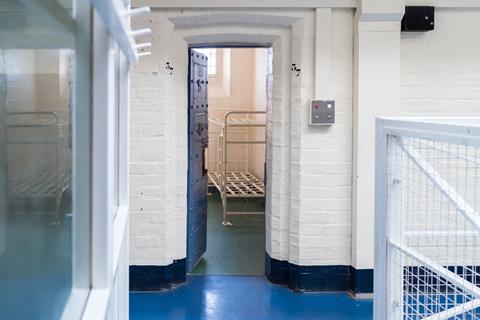Our prisons are in a state of crisis. There are over 87,000 people in prison in England and Wales, almost double the prison population in 1993. We have the highest imprisonment rate in Western Europe. For some time, the system has been operating at close to maximum capacity, and many individual prisons are overcrowded and are in unacceptable physical conditions.

Prisons are an indispensable part of the criminal justice system, and the problems affecting prisons affect the system as a whole.
The vast majority of prisoners will one day be released into society – and crisis response measures mean that some are being released earlier than expected. But many people leave prison only to reoffend. Reoffending, which costs a staggering £18 billion a year, reduces public safety and confidence in the criminal justice system.
The government has committed to building more prisons and more prison spaces. But achieving a reduction in reoffending requires more than simply creating more prison spaces. To find a way through the current crisis, we need to ask the simple question: 'What are prisons actually for?'
This is the question that the Lords Justice and Home Affairs Committee seeks to answer in our new report Better prisons: less crime. It follows an 8-month long inquiry focusing on the governance, leadership and staffing of prisons.
We argue that while prisoners are punished by the loss of liberty, when they are in prison the point is not to punish them further, but to reduce the likelihood of them re-offending when they leave.
Our recommendations focus on four key areas. We make the case for more autonomy for prison governors. We call on HMPPS to address serious shortcomings in the recruitment and training of prison officers. We argue that providing purposeful activity for prisoners should be at the heart of the role of a prison officer. And we argue for more effective accountability of prisons and of the currently inflexible bureaucracy which sits on top of them.
First, the role of the prison governor. Governors have overall responsibility for their prisons, but are hindered by an over-complicated and confusing management structure, excessive bureaucracy, and lack of autonomy. We heard a shocking example of a governor spending three days trying to arrange for the replacement of a kitchen appliance. In addition, governors are provided with inadequate support and professional development opportunities, lack of continuity (with governors frequently transferred between prisons) and inadequate sharing of good practice.
The Ministry of Justice must strike a better balance between governor autonomy and centralised control, ensuring that governors have the necessary freedom to lead effectively. Governors must be afforded the time to be out and about in their prisons, interacting with staff and prisoners, driving the culture forward from the front.

Read more
Next is the severe recruitment and retention crisis of prison officers with high turnover, low morale and a shortage of experienced staff. But the current arrangements seem almost designed to ensure prison officers fail. The lack of direct face-to-face interviews in the recruitment arrangements, for example, provides no opportunity to establish the suitability of candidates. Nor are there regular, formal, prison officer reviews or adequate training. Line managers often have responsibility for 20-30 staff. Prison staff are exposed to an extraordinary range of complex situations, with incredibly vulnerable people, who have a diverse range of needs. Yet too often they are left exposed, without the support they need to take care of prisoners and themselves. This must change.
Then there is the issue of what to do with prisoners when they are inside and preparing them for their release. Too many prisoners spend too long in their cells, with limited access to purposeful activity. This leads to boredom, self-harm, frustration, and increased violence. There is poor support for prisoners with mental health and addiction problems. Access to education is limited despite its proven positive impact on reducing reoffending. Access to skills training linked to market needs is also limited. Providing purposeful activity is not just a ‘nice thing to have’. Without crucial education and employment interventions, people are leaving prison without the necessary skills to ensure they do not reoffend.
Finally, there is the issue of accountability. The oversight mechanisms for prisons and HMPPS are poor. The data around prisons and prison performance is poor.
His Majesty’s Inspectorate of Prisons (HMIP) oversees the safety and effectiveness of prisons. But the chief inspector’s recommendations often have little impact and fail to be implemented. As we heard, they have been 'reduced to ringing an alarm bell that has no clapper in it'.
The inspectorate must be given enhanced powers including the ability to place prisons in special measures and require reports from prisons and HMPPS on actions taken in relation to recommendations.
The stark conclusion is that MoJ and HMPSS have failed to improve the prison service to reduce re-offending. It is now in a parlous state. We have high levels of re-offending requiring the need to keep building more and more prisons. It is unsustainable. It costs over £53,000 a year to house each prisoner, thirteen times as costly as community based sentences.
However, if reducing reoffending becomes the key role of prisons with governors given greater autonomy and support, a transformation of measures to recruit, assess and train prison officers and enhanced accountability of both prisons and HMPPS we can have better prisons and reduced reoffending.
Ministers and others need to make the case to the public for why reform is essential and seek to build cross-party support for doing so. The present prisons minister understands the need for change and what needs to be done, and he should be strongly backed by the prime minister and the secretary of state for justice.
It is essential and possible to build a better prison system that protects the public and helps reduce re-offending. That should be the core purpose of HMPPS. We cannot afford to fail.
Lord Foster of Bath (former MP Donald Foster) is chair of the Lords Justice and Home Affairs Committee































6 Readers' comments